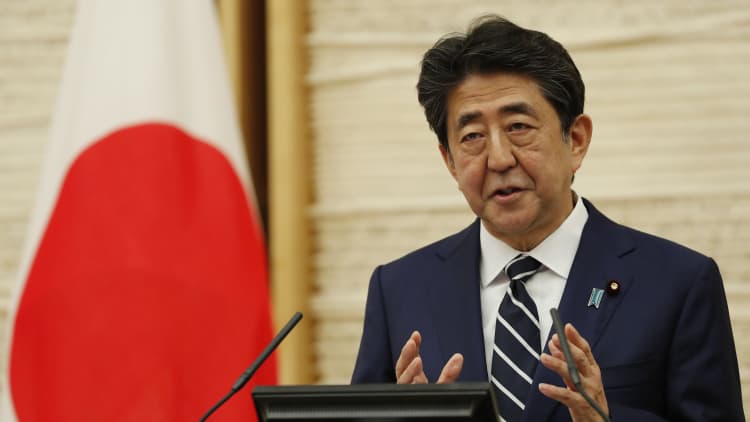
Japanese Prime Minister Shinzo Abe announced Friday he is stepping down due to worsening health, bringing an early end to his stint as the longest-serving government leader of the world's third-largest economy.
The 65-year-old Abe told reporters during a televised press conference that his health started declining around the middle of last month. The prime minister, who suffers from chronic ulcerative colitis, an inflammatory bowel disease, said he was resigning because he did not want his illness to result in any policy mistakes.
"I needed to fight against the disease and be treated, and I was not really in a perfect state in terms of the health condition," Abe said, according to a translation.
"I would like to send my apologies to the people of Japan."
Abe said he would fulfill his duties as prime minister until the next leader is appointed. His current term was not due to end until September 2021.
The announcement came after state broadcaster NHK reported that he was about to stand down.
Japan's Nikkei 225 index closed 1.4% lower on Friday, while the yen strengthened against the dollar, trading at 105.8.
The prime minister's departure will kickstart a leadership race in the governing Liberal Democratic Party, with the winner to be formally elected in parliament and to serve for the rest of Abe's term.
Some of Abe's possible successors include Suga Yoshihide, 71, the current chief Cabinet secretary, and Finance Minister Aso Taro, 79.
Abe's protege, Kishida Fumio, 63, and his longtime rival Ishiba Shigeru, 63, are described as "underdogs" to succeed the prime minister, according to Scott Seaman, Asia director at risk consultancy Eurasia Group.

Abenomics
Abe had previously resigned as prime minister in 2007 following a flare-up of his condition but returned to the top job after his party registered a landslide election victory in 2012. His two stints as prime minister mean he has been in the role for a total of nearly nine years.
Since resuming the office of prime minister, Abe has sought to revive Japan's lackluster economy through a policy package dubbed Abenomics. He said Friday that the economic policy had succeeded in boosting jobs and brought an end to 20 years of deflation.
As he explained his decision to leave office, Abe also stressed the country would need to "avoid any obstacles" when it comes to fighting the coronavirus.
At a time when many countries are bracing for a possible surge in Covid-19 infections over winter, Japan's leader said the necessary measures to protect people had already been put in place. Therefore, he said, the timing was appropriate for a change in leadership.
Japan has recorded nearly 66,000 cases of the Covid-19, with 1,242 related deaths, according to data compiled by Johns Hopkins University.
While the pandemic has hammered economies globally, Japan was already reeling from a drop in consumer spending after it hiked the consumption tax rate in October. The country entered a technical recession after its economy shrank at an annualized rate of 3.4% in the January to March quarter.
Japan's economy contracted at an annualized rate of 27.8% in the April to June quarter, marking its third quarter of declines. Reuters reported that plunge wiped out gains from Abenomics stimulus policies.



